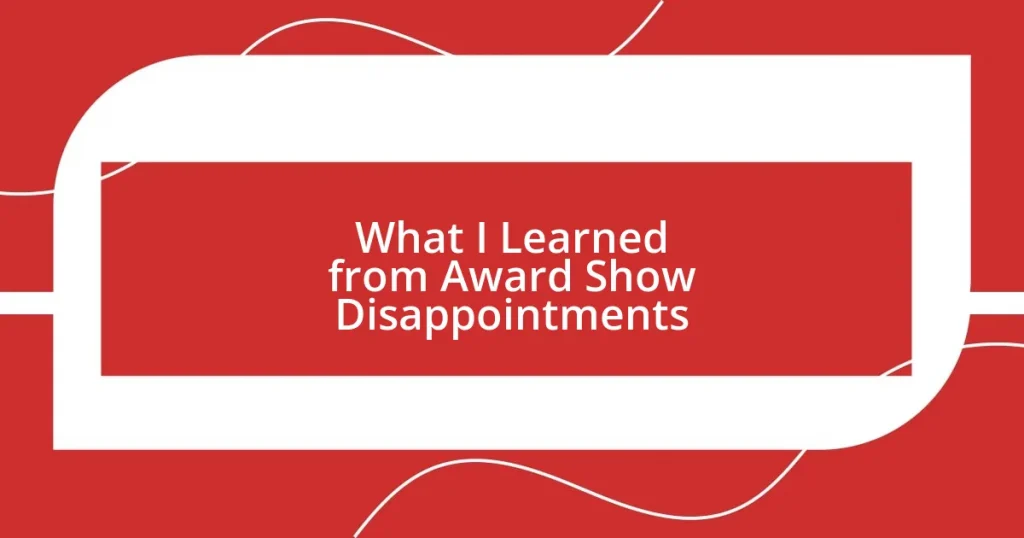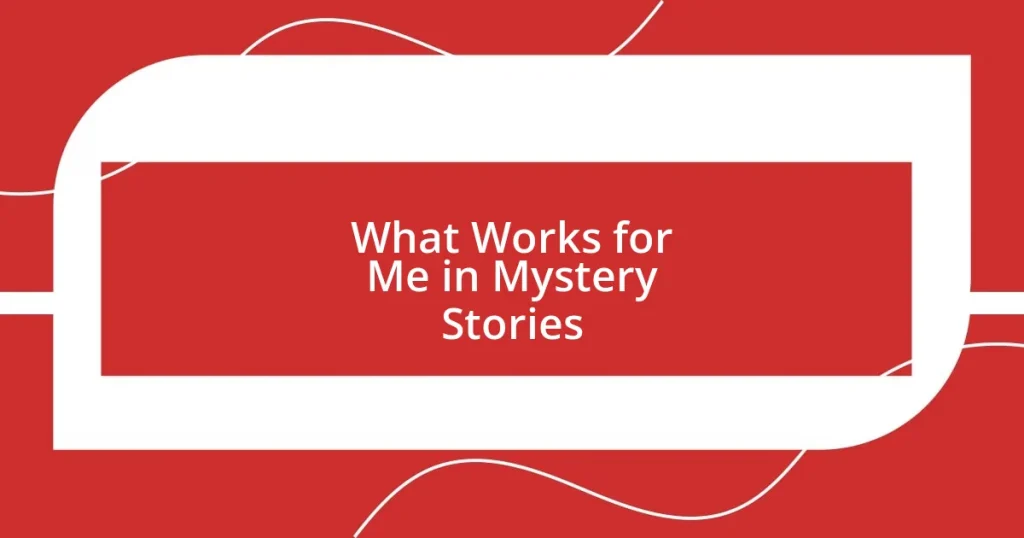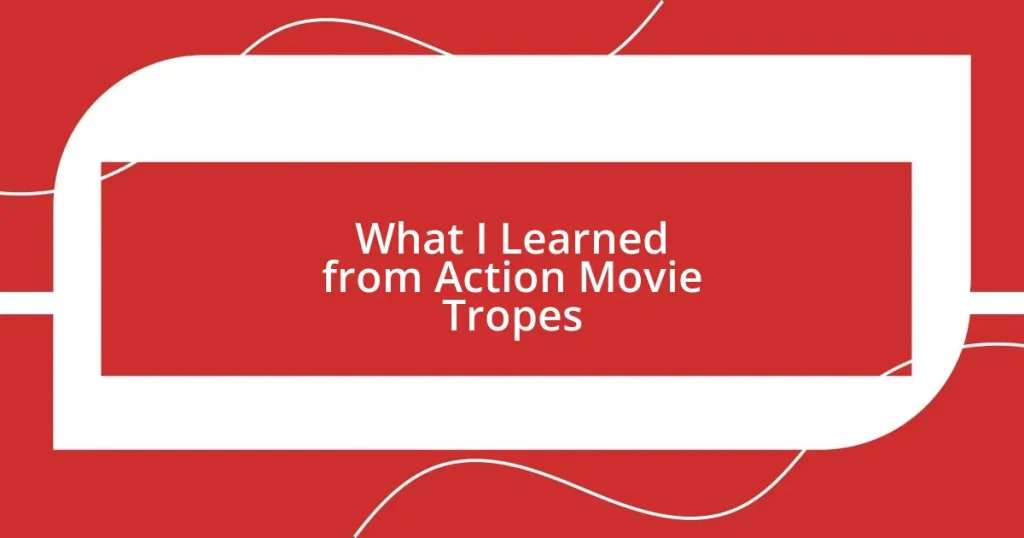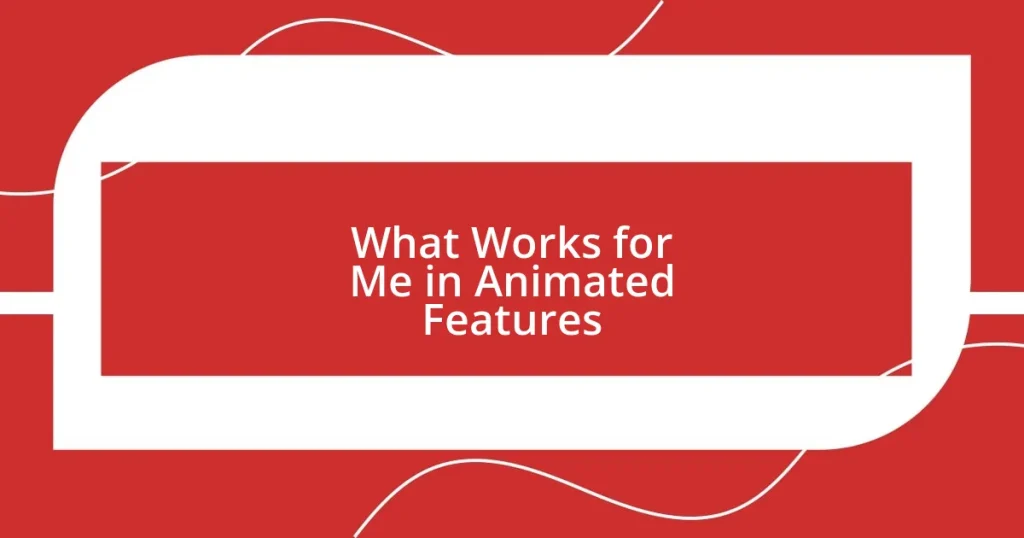Key takeaways:
- Award shows reflect societal values and biases, influencing both admiration and disappointment among fans.
- Personal expectations can lead to profound disappointment when outcomes do not align with hopes, highlighting the importance of managing those expectations.
- Disappointments at award shows can foster meaningful discussions about artistry, talent, and the subjective nature of success beyond accolades.
- Transforming disappointment into motivation encourages a deeper exploration of art and community, reshaping how individuals engage with overlooked talent.
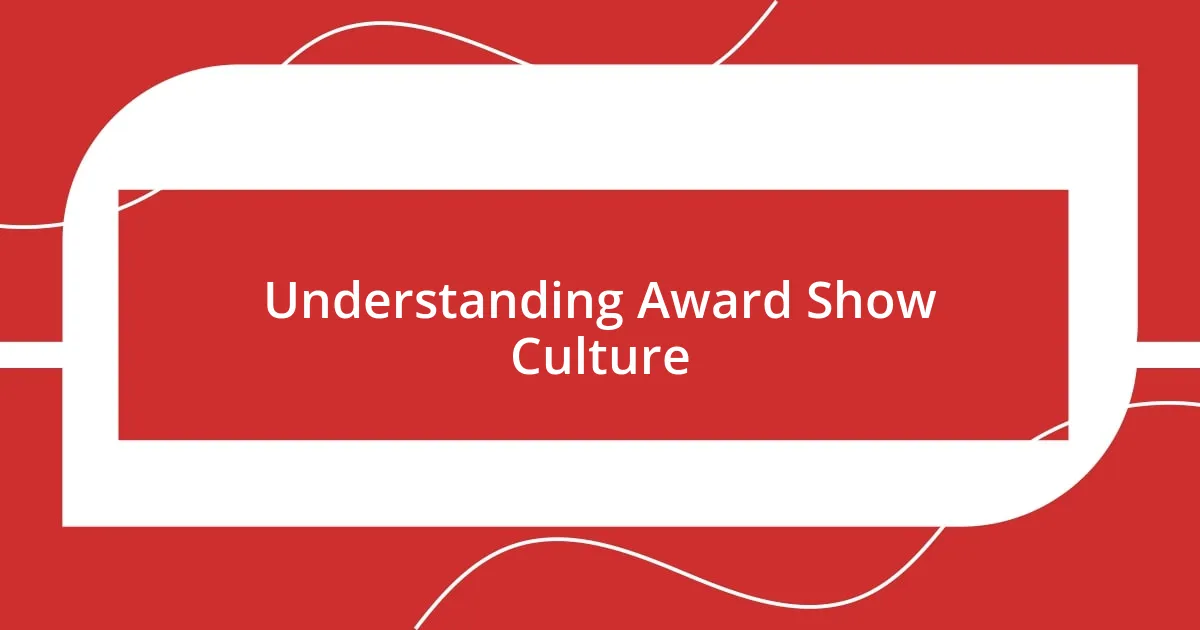
Understanding Award Show Culture
Award shows have become a fascinating blend of celebration and scrutiny, where the glitz of the red carpet meets the raw nerves of anticipation. I remember watching an awards ceremony as a child, my heart racing as the nominees were announced. The electric atmosphere was almost palpable, but I quickly learned that admiration for the nominees sometimes mingles with disappointment when favorites don’t win. Why does it matter so much? Perhaps it’s about validation; we often see ourselves in the art and artists we love.
The culture surrounding these events can be as intriguing as the awards themselves. Each show feels like a microcosm of society, reflecting our values and biases. I often wonder if we place too much emphasis on accolades. As I witnessed the uproar over unexpected winners, I felt a mix of confusion and empathy for artists who pour their hearts into their work. I realized that, behind the shimmer, there’s a human story of hopes dashed or dreams fulfilled.
It’s also interesting to note how award shows can sometimes spark dialogue about diversity and representation. There have been moments that stirred significant conversation, and I found myself engaged in discussions about who gets recognized and who is overlooked. It raises important questions about the criteria we use to judge talent. Are we celebrating art or are we heroes of a certain narrative? Understanding this culture has helped me see beyond the awards and to appreciate the broader implications of these events.
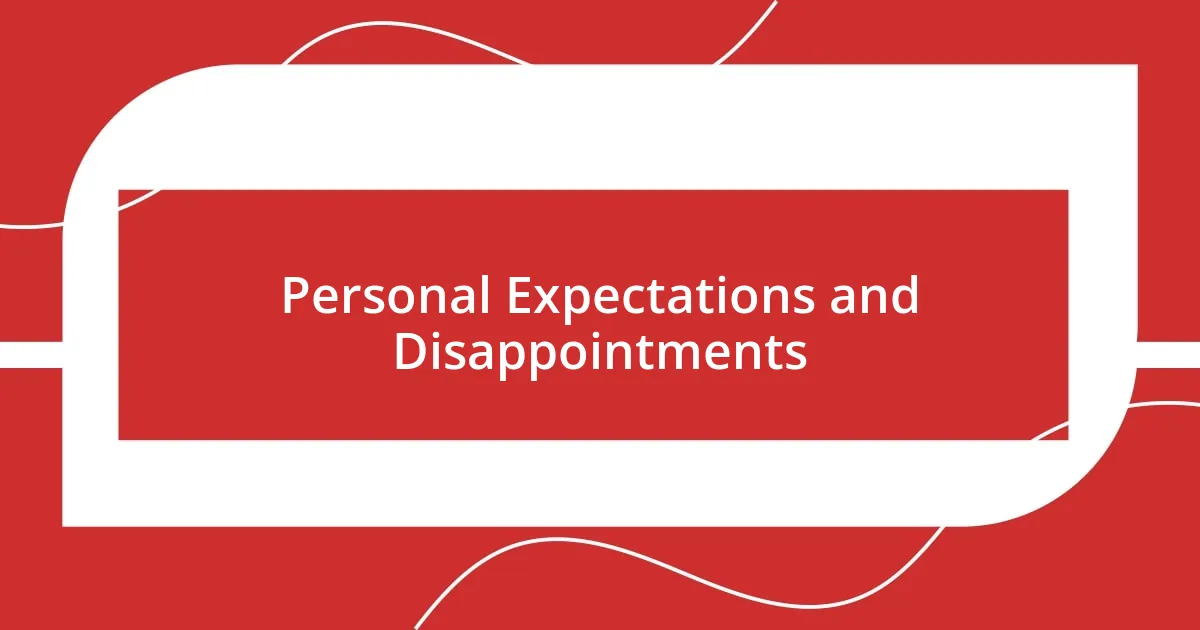
Personal Expectations and Disappointments
As I reflect on my past experiences with award shows, I can’t help but think about the times I felt let down by the outcomes. I remember rooting for a specific film, my excitement building as it neared the coveted award. When it didn’t win, it was like a punch to the gut. I realized then that personal expectations can sometimes soar higher than reality, leading to moments of genuine disappointment.
- Disappointment often arises when personal connections to a nominee are strong.
- The disparity between expectations and reality can lead to a fleeting sense of loss.
- I found it’s essential to manage my expectations to enjoy the ceremony more fully.
- Engaging with fellow fans during these events enhanced both my excitement and my sense of disbelief when favorites lost.
- I discovered that acknowledging the feelings of disappointment could also lead to deeper discussions about the nature of success and recognition in the arts.
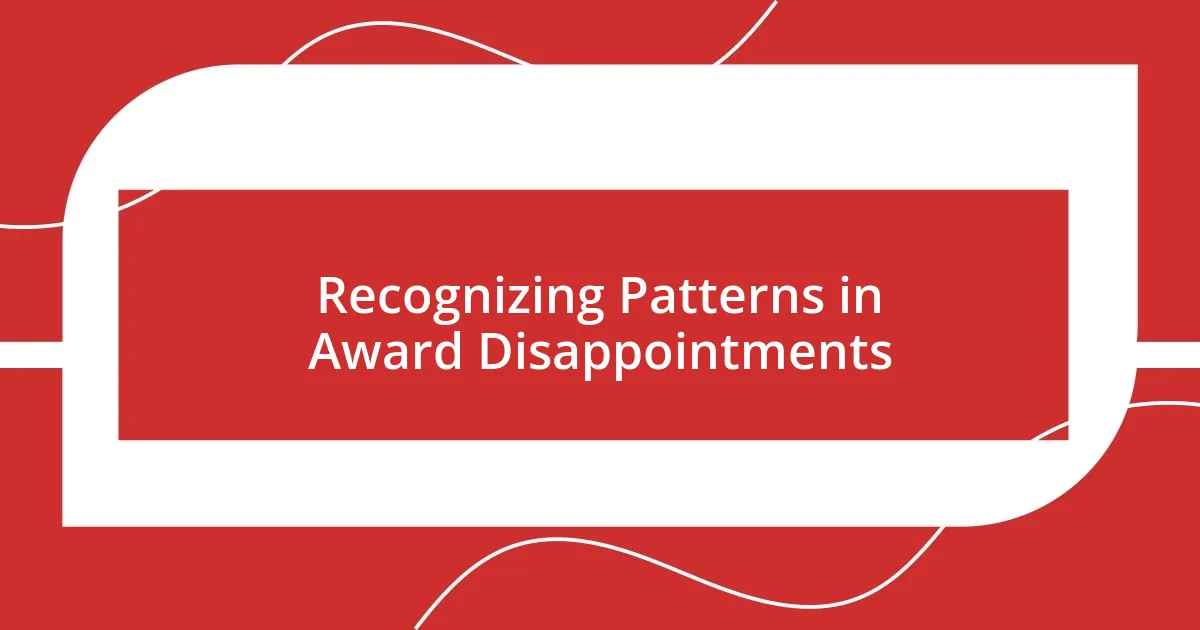
Recognizing Patterns in Award Disappointments
Recognizing patterns in award disappointments reveals fascinating insights into how we process our feelings around recognition and success. I often find myself reflecting on the most surprising snubs that have left me bewildered. Take, for example, when a beloved film I cherished was passed over at a major ceremony. It made me question not just the outcome, but the voting processes behind closed doors. Each disappointment seems to follow a familiar arc: expectation, investment, and then disillusionment.
At times, it feels like there’s a collective groan echoing through the audience when a favorite is overlooked, which, if I’m being honest, stings a bit more when it’s a film that resonates personally. The disappointment doesn’t just stem from a single loss; it’s a culmination of hope intertwining with disappointment that I see mirrored in others. I recall the social media outrage and heartfelt commentary from fans who poured their hearts into supporting a nominee. This common experience connects us, revealing a shared vulnerability often hidden behind the glamour.
Furthermore, analyzing these patterns makes me more aware of how biases can influence these awards. In my own experience, I’ve perceived a trend where historically, certain genres or voices receive less recognition. It’s interesting to note how discussions of diversity often ignite debates about what constitutes ‘best.’ Have you ever felt the weight of that conversation? I think it’s crucial to acknowledge these layers behind disappointments at award shows, as it reflects broader societal challenges and interests, giving us a chance to learn and grow together.
| Moment of Disappointment | Common Reactions |
|---|---|
| Favorite film not winning | Shock and disbelief, often shared on social media |
| Unexpected winner | Confusion, questioning the criteria for selection |
| Repeated snubs of a genre | Frustration and conversation around systemic bias |
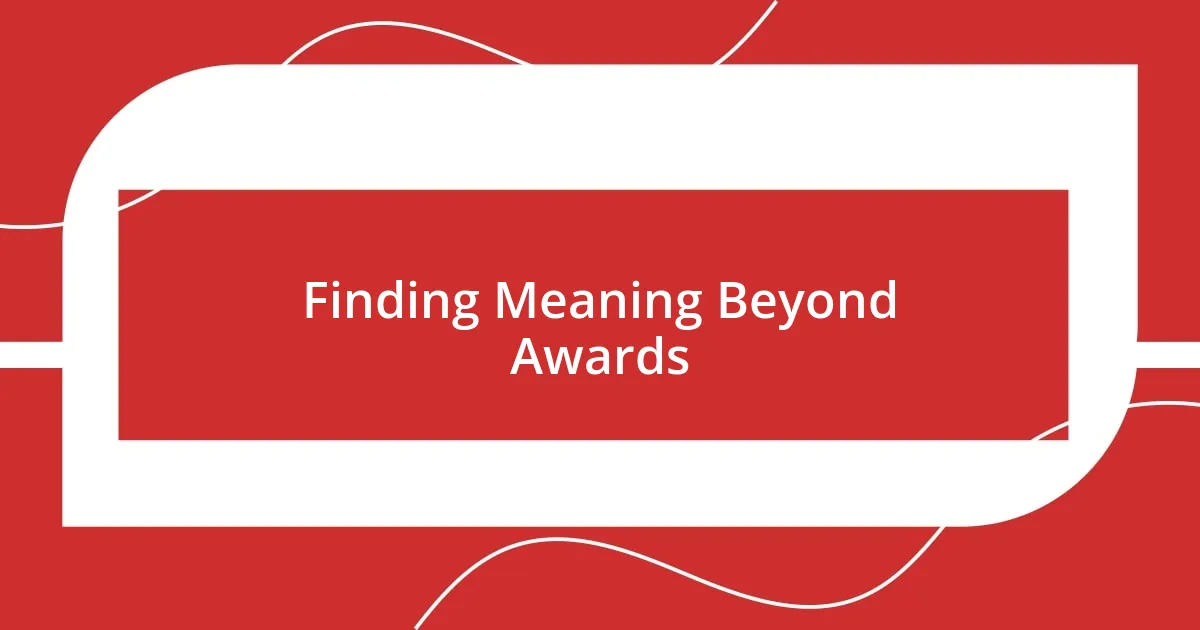
Finding Meaning Beyond Awards
Finding meaning beyond awards brings a personal revelation to the surface for me: recognition isn’t the only gauge of worth. I recall a moment when my favorite indie film didn’t clinch an award, yet it inspired deep conversations among friends and sparked a renewed appreciation for its artistry. This experience made me realize that, sometimes, the impact of a movie transcends accolades, living on in the hearts of those who connect with its message.
Have you ever had an experience where the journey meant more than the destination? I felt that profoundly when discussing the overlooked film with fellow fans. Our debates and shared insights illuminated the film’s themes and craftsmanship, which felt more rewarding than any trophy. This sense of community and the ensuing conversations opened my eyes to the idea that the true measure of success lies in the connections we forge and the discussions we spark.
In moments of disappointment, I’ve learned to look inward and evaluate what these experiences teach me about my tastes and preferences. For instance, when a favorite director was ignored, I found myself reevaluating what I value in storytelling. I began to appreciate the nuances of the art rather than focusing solely on the industry’s recognition. This shift in perspective has enriched my understanding and enjoyment of cinema, showcasing that meaning often lies in the experience rather than the accolades.
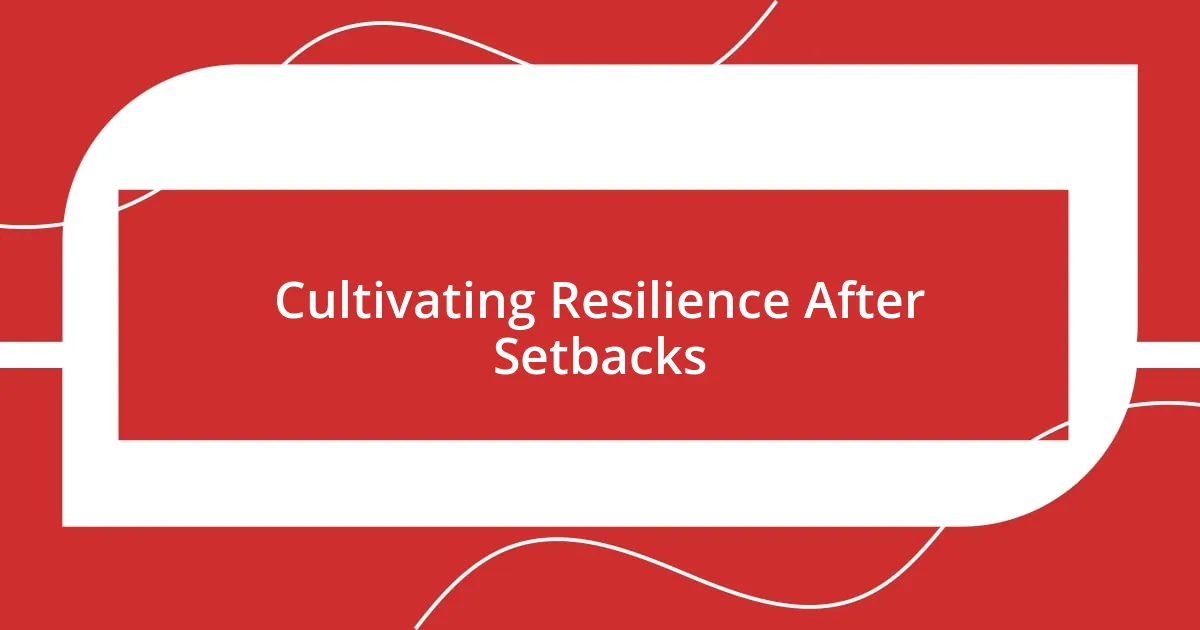
Cultivating Resilience After Setbacks
Cultivating resilience after experiencing setbacks, especially in the context of award show disappointments, has become a vital part of my emotional toolkit. I remember the sting of seeing my favorite actor overlooked for a coveted role. It felt unfair, yet it prompted me to ask: what does recognition even mean? Instead of allowing the disappointment to consume me, I found strength in the realization that failure can fuel growth and reflection.
In my experiences, those moments of letdown often spark deeper conversations around artistry and talent. For instance, when the buzz surrounding a film fizzled out unexpectedly, I found comfort in sharing my thoughts and feelings with friends. Our discussions turned into a space to celebrate what we loved about the film, rather than fixating on its lack of accolades. It became clear that joy doesn’t solely hinge on awards; it flourishes in shared experiences and insights.
I’ve also discovered that every setback is a chance to reassess my expectations and the standards I uphold. After a particularly disappointing award show, I took time to explore lesser-known films that resonated with me. This shift in focus not only diversified my viewing experience but also reminded me that art is subjective and personal. Have you ever come across a hidden gem that resonated with you more than an award-winning title? Embracing this idea has strengthened my resilience, teaching me that the journey through art is often more rewarding than the accolades it receives.
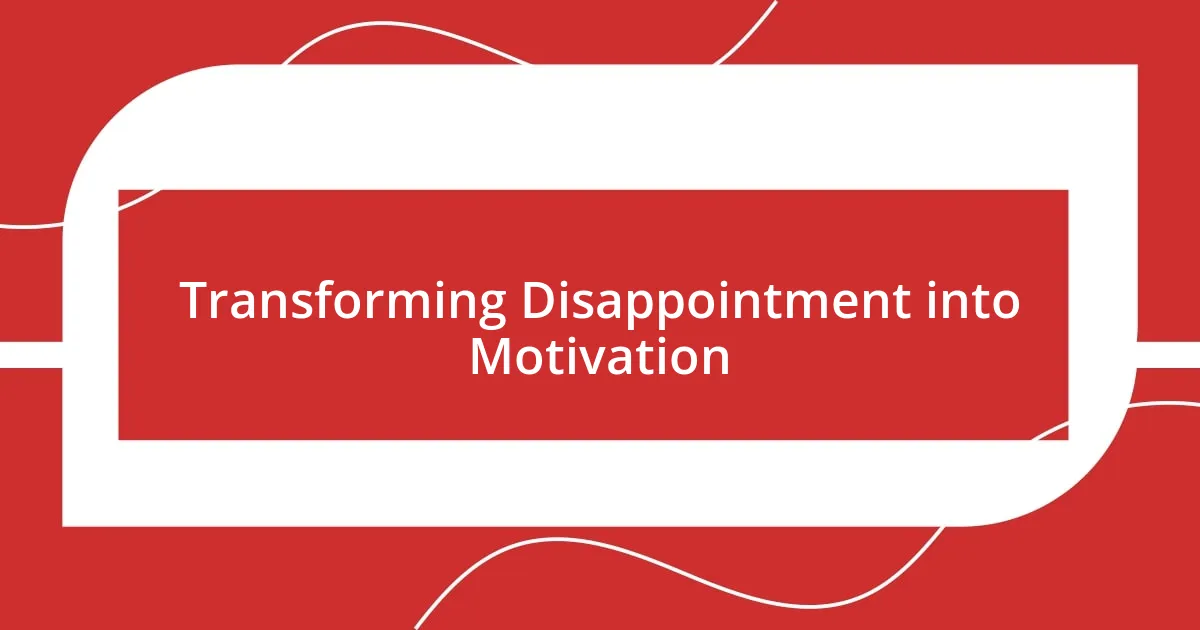
Transforming Disappointment into Motivation
Transforming disappointment into motivation can be a powerful journey. I vividly recall feeling let down when a beloved film didn’t receive recognition at a major awards ceremony. Instead of sulking, I channeled that energy into creating a blog post celebrating its lesser-known merits. That experience pushed me to reflect on why I connect with certain pieces of art, motivating me to write more passionately about what truly resonates with me.
In times of disappointment, I’ve often found inspiration through my community. After I shared my frustrations about an overlooked actor with friends, we gathered for a movie night dedicated to their underrated performances. The discussions that followed were eye-opening, allowing us to reframe disappointment as a catalyst for acknowledging talent that often flies under the radar. Have you ever considered how missed recognition can lead to a richer exploration of overlooked gems?
Moreover, I’ve learned to reframe my perspective on validation. Once, after a disappointing award outcome, I stepped back to reflect on my personal criteria for greatness in storytelling. This introspection not only deepened my understanding of what I cherish in film but also fueled my enthusiasm to support independent artists. It’s intriguing to think about how the pain of disappointment can ignite a more profound commitment to what we love, motivating us to advocate for the art that profoundly impacts us.










